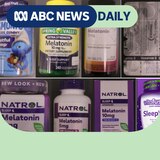
The rising popularity of melatonin supplements has prompted the Therapeutic Goods Administration (TGA) in Australia to issue a warning against the use of imported products. Testing revealed that many of these melatonin items do not comply with local standards, raising concerns about their safety, especially for children. The TGA’s advisory comes amid an alarming increase in calls to poison hotlines related to melatonin ingestion among minors.
Melatonin, often referred to as the sleep hormone, has gained a reputation for aiding sleep, leading to its widespread adoption over the past five years. According to Professor Sarah Blunden, a paediatric sleep researcher at Central Queensland University, its use has expanded beyond children with specific needs, such as those on the autism spectrum or with ADHD. Parents have increasingly turned to melatonin to address their children’s sleep difficulties, often purchasing it online from countries with less stringent regulations.
The appeal of melatonin supplements is evident, as many parents report success in helping their children sleep better. One parent noted, “I have found that melatonin has assisted us getting our toddler to sleep when it’s been particularly challenging.” Another shared, “We moved bedtimes down to being about an hour long, and the calmness they both experienced was quite mind-blowing.”
Despite these anecdotal successes, the TGA’s warning highlights serious risks associated with the unregulated products available online. In the past year, the poison hotline received nearly 1,500 calls concerning children who ingested melatonin. Many of the products marketed to children, particularly those in gummy form, can contain varying levels of the hormone, with some exceeding safe doses by up to 400%.
“This is a worrying problem,” said Professor Blunden, emphasizing that the lack of regulatory oversight for melatonin in the United States, where many of these products originate, contributes to the issue. As these supplements are considered dietary supplements rather than pharmaceuticals in the U.S., parents purchasing them online may unwittingly expose their children to dangerous dosages.
The TGA has taken steps to address these concerns. The agency has advised consumers to refrain from using imported melatonin products, affirming that there is no assurance of safety or efficacy in those marketed for children. “We can’t take them with any assurance,” Professor Blunden stated, noting the variability in melatonin levels even within the same batch of gummies.
For parents in Australia, the TGA’s guidance indicates that melatonin prescribed by local healthcare professionals may still be acceptable. If a general practitioner or paediatrician determines that a child is experiencing significant sleep issues, they may prescribe compound melatonin produced by regulated pharmacies, ensuring accurate dosing.
While melatonin is naturally produced by the human body to regulate sleep-wake cycles, Professor Blunden cautioned against its indiscriminate use, especially in children. “There is no evidence that suggests that children with sleep issues are deficient in melatonin,” she explained. Instead, behavioural interventions and healthy bedtime routines are often recommended as more effective solutions for sleep challenges.
As melatonin’s popularity continues to rise, parents are advised to seek guidance from medical professionals rather than relying solely on over-the-counter solutions. Professor Blunden stressed the importance of exploring sustainable behaviours that can improve sleep, such as cognitive behavioural therapy for insomnia and other behavioural sleep interventions.
In light of the TGA’s warning and the ongoing concerns regarding unregulated melatonin use, parents are urged to avoid online products and consult with healthcare providers for safe and effective sleep solutions for their children.






